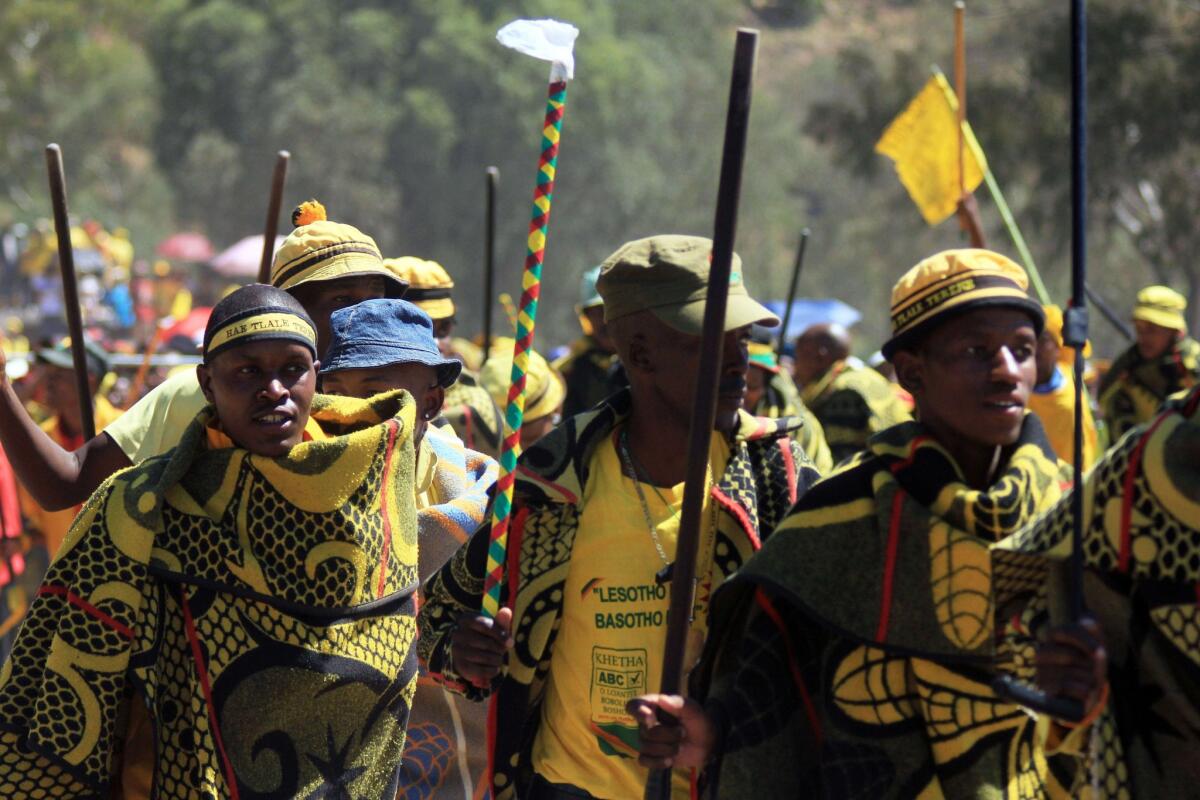Why Lesotho’s election is a crucial test for African democracy

- Share via
Reporting from Johannesburg, South Africa — In Africa’s year of elections, with democracy in retreat in many parts of the continent, Lesotho is a pygmy beside giants like Nigeria and other larger nations facing votes.
But many observers are watching the small mountain nation as it heads to the polls Saturday, one of just a handful of African countries that in the past has seen a peaceful democratic handover of power from one party to another.
Lesotho’s democratic credentials are in question after an attempted coup in August forced Prime Minister Tom Thabane to flee the country.
Saturday’s balloting is supposed to resolve the crisis, if friction between political opponents and rival branches of the security forces doesn’t derail the process.
Among the other countries facing elections this year are Sudan, Ethiopia, Ivory Coast, Tanzania, Mali, Burkino Faso, Burundi, Chad, Niger, Mauritania, Guinea, Central African Republic, Togo and Mauritius.
Jeff Smith, an Africa specialist at the Robert F. Kennedy Center for Justice and Human Rights, said Lesotho’s election is significant because the nation of 2 million had been a leader in democracy, press freedom and human rights in Africa, as other parts of the continent had seen a backslide in democratic values.
“Lesotho’s important because, despite its problems last August, it is often regarded as a democratic standard-bearer throughout Africa,” said Smith. “It’s got a pretty big reputation to uphold.”
He said Lesotho was one of the freer countries, as democratic gains are peeled back in many parts of sub-Saharan Africa.
“We have what I’d describe as a democracy recession. There’s a really worrying trend of leaders peacefully stealing elections,” said Smith, citing subtle methods such as the manipulation of voter rolls by incumbent parties to maintain a grip of power without using outright violence.
The most dangerous sign as Lesotho heads to the polls is the politicization of the security forces. In last year’s crisis, the police supported Thabane while the army supported a rival.
In August, soldiers surrounded Thabane’s official residence in Maseru, the capital, forcing him to flee to neighboring South Africa. Troops also attacked three police stations, cut power to the city and shut down radio stations.
Thabane returned in September and is running in Saturday’s election.
Lesotho is the principal supplier of water to neighboring South Africa’s vital mining and industrial area. South African political heavyweights, including President Jacob Zuma and his deputy, Cyril Ramaphosa, intervened to try to restore stability by bringing forward the elections, which had been due in 2017.
Ramaphosa recently extracted a pledge from Lesotho’s military leaders that soldiers would remain in their barracks during the voting and not interfere.
After the attempted takeover, coup leader and military commander Lt. Gen. Tlali Kamoli fled to the mountains with 200 men and a large supply of weapons and ammunition. But he was forced to leave the country in November.
However, the entrenched divisions between the political rivals and between the army and police are worrying, said Smith.
“I think it’s very dangerous and it’s one of these issues that’s probably been beneath the surface,” he said.
The crisis began with a split last year within the coalition government between Thabane’s All Basotho Convention party and Deputy Prime Minister Mothetjoa Metsing’s Lesotho Congress for Democracy. The prime minister suspended parliament after Metsing’s party joined the opposition Democratic Congress party in trying to engineer Thabane’s removal through a parliamentary vote of no confidence.
The country’s economy is heavily reliant on a preferential trade program, the African Growth and Opportunity Act, that exempts exports to the U.S. from duty.
If Lesotho’s crisis isn’t resolved peacefully through Saturday’s vote, the country risks losing that trade status, potentially plunging the economy and the lives of its population into crisis, Smith warned.
“Given the precarious economic situation experiences by many people, the average person can ill afford any further disruption to their lives,” Smith said.
Under Lesotho’s election system, the party -- or coalition of parties -- that command a parliamentary majority select a prime minister as the nation’s leader.
Follow @robyndixon_LAT on Twitter for news out of Africa
More to Read
Sign up for Essential California
The most important California stories and recommendations in your inbox every morning.
You may occasionally receive promotional content from the Los Angeles Times.










